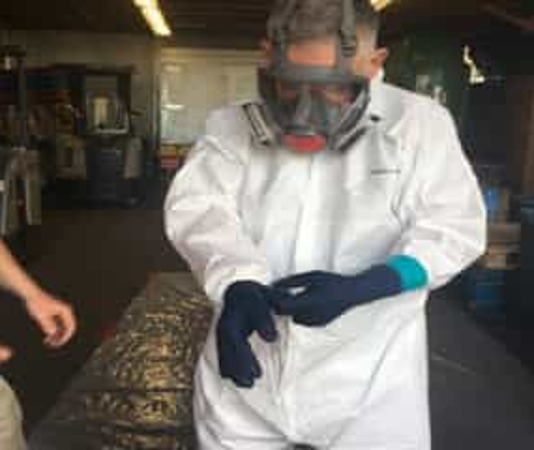
What is Deep Cleaning/Decontamination and How Restaurants Are Doing It During the Coronavirus Pandemic
Preparing Workplaces For COVID-19
The CDC has issued guidelines for reopening businesses. Once you reopen your business, you cannot let your guard down. To reassure your customers and employees during the COVID-19 pandemic, you need to develop and implement a decontamination program.
The virus is primarily transmitted when a person is exposed to respiratory droplets released in the air when an infected person sneezes or coughs. To prevent this from happening, businesses are instructing their employees to wear masks and practice social distancing.
Though the primary mode of transmission for COVID-19 is through close contact with an infected person, there is a slight chance that a person may get infected by touching a contaminated surface.
But businesses are taking no chances. Many employers have joined hands with companies to develop and implement deep cleaning programs.
The demand for coronavirus deep clean services in Sonoma County and elsewhere has increased sharply over the last few months. Many businesses have hired coronavirus deep cleaners to decontaminate their facilities and maintain a hygienic environment.
What Are High-Touch Points?
High-touch points or high-touch surfaces are the surfaces that people come in contact with multiple times a day. Typical examples include lift switches, light switches, keyboards, faucets, and countertops.
Because several people touch these surfaces every day, they should be cleaned regularly to prevent cross-contamination. To create a safe and hygienic environment, you need to improve the decontamination of high-touch surfaces.
Answering the Million Dollar Question: What is Deep Cleaning?
Deep cleaning! You must have heard this term several times in the past few months. Before we go any further, let’s first try to understand what does deep cleaning mean, and how it differs from regular cleaning.
Regular cleaning tasks often cover things such as dusting surfaces and areas, mopping the floors, and cleaning bathrooms and the kitchen. Regular cleaning tasks are performed at regular intervals (daily or weekly).
Deep cleaning, on the other hand, involves intense decontamination of areas including surfaces and carpets. Before the COVID-19 era, most businesses used to deep clean every 6-12 months. Deep cleaning will cover areas that are traditionally not covered by regular cleaning.
Some typical examples include:
- Under the sink
- Behind kitchen appliances such as the microwave and oven
- Inside and outside of windows
- Inside the oven
A Deep Cleaning Checklist
Reception Area
- Dust, sweep, and mop welcome mats and straighten them out
- Sweep and mop the floors. Thoroughly clean the carpets every few weeks or every month
- Using an EPA-certified cleaning product, wipe down the reception desk, counter, and phone. Thoroughly clean furniture and coffee table
- Thoroughly clean tables, chairs, lamps, window shades, and other surfaces
- Clean the front door on both sides
- Empty all trash cans and wipe them down. Replace their liners
Kitchen/Break Area
- Thoroughly clean the refrigerator. Get rid of unclaimed items. Wipe down shelves with an EPA-registered, eco-friendly cleaning product
- Vacuum or clean and mop the floor
- Thoroughly clean sinks and faucets with an EPA-registered cleaning product
- Empty trash and recycling receptacles. Replace liners and deep clean receptacles
- Deep clean counters and the coffee maker
Bathrooms
- Remove scale from bathroom tiles, showerheads, and taps
- Empty and deep clean trash receptacles and sanitary napkin dispensers
- Sweep and mop the floor with a floor cleaner or detergent solution
- Thoroughly clean sinks, toilet seats and covers, towel dispensers, toilet paper dispensers, hand dryers, and taps
- Clean the mirror (over the sink) with a glass cleaner
- Refill dispensers
Cubicles
- Deep clean shelves, cabinets, doorknobs, light switches, keyboards, and other high-touch surfaces with an EPA-certified cleaning product
- Empty trash receptacles. Thoroughly clean them and replace liners
- Clean HVAC vents
- Dust and launder blinds and shades. Clean the window sill
- Clean window glass and other glass surfaces
- Sweep and mop/vacuum the floor
- Clean chair arms and desks with a mild, EPA-certified cleaning product
Cleaning Products to Use
Use EPA-certified cleaning products. Steer clear of toxic products that, apart from harming the environment, can cause health problems. Before buying cleaning products, remember to go through the list of products tested for effectiveness against the Coronavirus by the CDC. The list also includes wipes and sprays.
You can also use a diluted bleach solution (if appropriate for the surface). Your bleach must contain 5.25 percent to 8.25 percent sodium hypochlorite.
The Right Way to Deep Clean
First, dust the surface/area you want to deep clean. Though this won’t remove viruses and bacteria, it will prepare the surface for deep cleaning. Once you have removed dust from the surface, wipe it down with an EPA-certified cleaning product.
Hiring a Coronavirus Deep Cleaner
Here are some questions to ask a Coronavirus deep cleaner before hiring them:
- What safety precautions do you take?
- Can you walk me through the deep cleaning process?
- Do you hold any certifications?
- What cleaning products do you use?
- How long does a deep clean take?
- How long will the workplace stay decontaminated?
- Is there anything I need to do to prepare?
West Coast Fire & Water offers professional deep cleaning and decontamination services in Sonoma County. We use time-tested methods and modern equipment to deep clean areas and surfaces. To discuss your requirement with one of our professionals, call us at 707-504-3708.

